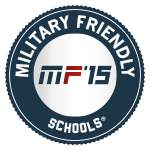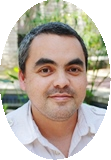AOMA Graduate School of Integrative Medicine has been named a 2015 Military Friendly® School by Victory Media, the leader in successfully connecting the military and civilian worlds.
 The Military Friendly® Schools designation is awarded to the top 15 percent of colleges, universities and trade schools in the country that are doing the most to embrace military students, and to dedicate resources to ensure their success in the classroom and after graduation.
The Military Friendly® Schools designation is awarded to the top 15 percent of colleges, universities and trade schools in the country that are doing the most to embrace military students, and to dedicate resources to ensure their success in the classroom and after graduation.
AOMA is proud to support student veterans – and proud of our students! To celebrate the announcement, we interviewed Tony Bailes, a master’s degree alum and current doctoral student at AOMA. In addition to being a full-time student, Tony is also the president of AOMA’s Student Veteran Organization and an active member of the campus community.
View the AOMA Acupuncture School listing on the G.I. Jobs website.
Tony Bailes, MAcOM, DAOM class of 2015
 Military Branch: US Army
Military Branch: US Army
Years Served: 4
What prompted you to return to school?
After serving as a combat medic, I knew I had found a home in health care. The feeling of knowing that I could make a difference in people's lives, even a small one, was the greatest reward. My time in the service had given me some much needed direction. The thought of returning to school at my age was a little frightening and I wasn't sure I was making the right decision.
Why did you choose AOMA?
My decision to go to AOMA was the result of two dominating factors. I wanted to stay in healthcare, but was feeling the rigors of emergency care. Acupuncture and integrative medicine offered me an opportunity to treat patients over time and see their progression, as opposed to the "turn and burn" of emergency medicine. Another decisive factor was AOMA as a community. I began my discussion while still in Iraq and when I was able to visit in person, all those positive interactions I had were reinforced. The sense of community was overwhelming. I knew immediately that I was where I was meant to be.
What military education benefits, such as the GI Bill, did you use while attending?
I used my Post 9/11 GI Bill and Federal Graduate Loans. I also took advantage of the Federal Work Study program.
What has your experience been like as a student or alumnus?
As with any process, there were ups and downs. The program can be challenging, but the journey taught me so much. After finishing the master’s program, I still felt a little lost. By some random turn of events, I ended up in the first DAOM program and could not be happier. Being in the DAOM program has taught me much about myself and my capabilities. I am grateful and proud to be part of the inaugural cohort. The friendships and connections I have created have been incredibly supportive and nurturing. Seven years after my initial contact, I still feel the same level of connection and the sense of community I did that very first day I walked onto campus.
What advice do you have for veterans returning to school?
The adjustment can be a challenge. The single most important thing to remember is that the knowledge, experience, and discipline we acquired serving our country is easily applicable to our educational journey. We understand commitment and hard work, and I feel that gives us that intangible edge. The end result of the challenge holds great reward. Find your community and draw on the lessons learned from our service time. Most importantly, reach out when you need help and embrace the great things that lie ahead.
What challenges and rewards have you experienced while working with military and veteran populations in clinic?
The challenges have been mostly in the communication and boundaries. Military members and veterans are part of a very defined subculture. We have our own language and biases. The language often associated with our medicine does not always resonate with the veteran and military community. Coming up with a vocabulary that is respectful, yet informative was the biggest challenge. Another challenge exists in boundaries. By nature, veterans and military members have a tendency to be more guarded. Trust is not easily earned. The ability to gain the level of trust needed to be effective takes effort and time. Our greatest strength is our sense of community. The sense of community is something that is well reflected of the culture of AOMA and I feel that being able to extend that grace to our patients, regardless of their background, is what makes AOMA so special.


